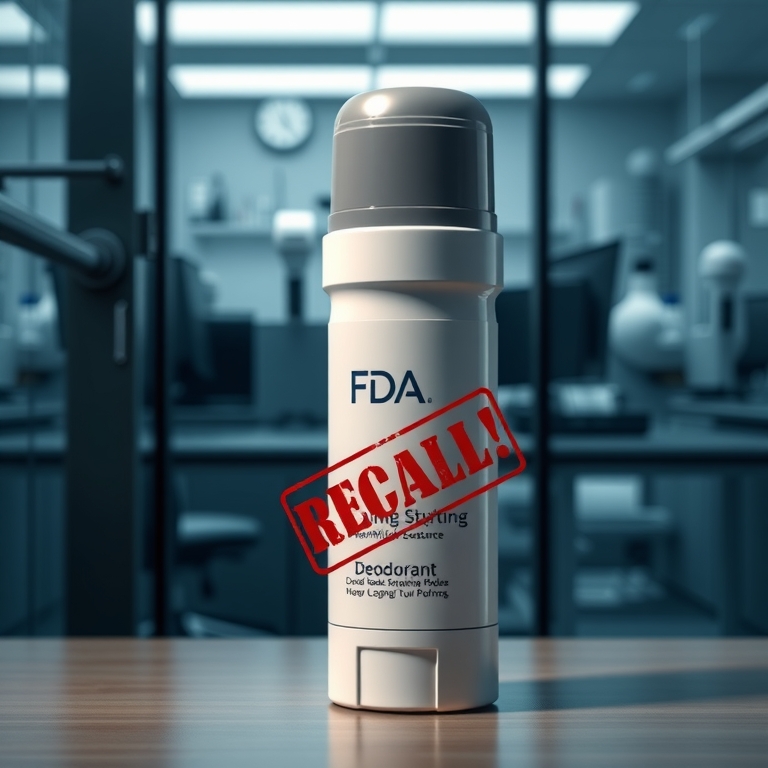In a surprising turn of events, the U.S. Food and Drug Administration (FDA) has issued a sweeping recall of several popular deodorant brands after routine testing uncovered the presence of potentially harmful substances. This announcement has sent shockwaves through the personal care industry, raising questions about product safety protocols and consumer protection measures. As the recall unfolds, manufacturers, retailers, and consumers alike are grappling with the implications of this discovery and the steps needed to address it.
The FDA’s decision to recall these deodorants stems from the detection of benzene, a known carcinogen, in certain batches of antiperspirants and deodorants. Benzene, a colorless or light yellow liquid at room temperature, is commonly used in the manufacturing of plastics, resins, and synthetic fibers. However, its presence in consumer products is a cause for concern due to its association with serious health risks, including leukemia and other blood disorders. The FDA’s findings have prompted an immediate response from manufacturers, who are now tasked with pulling affected products from store shelves and online marketplaces.
The recall has been met with swift action from major retailers, who are working diligently to remove the implicated products from their inventories. Many companies have also initiated refund campaigns to reassure customers and maintain brand trust. This proactive approach underscores the significance of the FDA’s findings and the urgent need to mitigate potential health risks to consumers. Concurrently, the personal care industry is facing increased scrutiny as stakeholders call for more stringent testing and quality control measures to prevent similar occurrences in the future.
For consumers, the recall has sparked widespread concern and confusion. Deodorants and antiperspirants are staple products in daily personal care routines, and many individuals are now questioning the safety of their go-to brands. In response, the FDA has issued detailed guidance on identifying affected products and encouraged consumers to discontinue use immediately. The agency is also urging those who have experienced adverse reactions to report their symptoms through its MedWatch program, which monitors the safety of FDA-regulated products.
This incident serves as a stark reminder of the complex regulatory landscape governing personal care products. Unlike pharmaceuticals, which undergo rigorous testing and approval processes, cosmetics and personal care items are subject to less stringent oversight. The FDA’s role primarily involves post-market surveillance, meaning that issues like the presence of benzene are often detected only after products have reached consumers. This regulatory gap has reignited debates about the need for reform in the oversight of personal care items, with advocates calling for more robust pre-market testing and clearer labeling requirements.
For manufacturers, the recall represents both a logistical challenge and a reputational crisis. Companies are now tasked with conducting thorough investigations into their supply chains to identify the source of contamination. This process involves scrutinizing raw material suppliers, manufacturing practices, and quality control procedures to prevent future lapses. Additionally, brands must navigate the delicate task of restoring consumer confidence in their products. Transparent communication and a commitment to enhanced safety measures will be crucial in rebuilding trust with consumers who may feel betrayed by this breach of safety.
The financial implications of the recall are also significant. While the immediate costs associated with pulling products and issuing refunds are substantial, the long-term impact on brand reputation could be even more damaging. Companies may face decreased sales as consumers turn to alternative brands perceived as safer. Furthermore, the recall may lead to increased regulatory scrutiny and potential legal actions, adding to the financial and operational burdens faced by affected manufacturers.
In the broader context of the personal care industry, this incident highlights the importance of innovation and adaptation in response to changing consumer expectations. As awareness of product safety and ingredient transparency grows, companies must prioritize these aspects to remain competitive. This may involve investing in advanced testing technologies, adopting more sustainable sourcing practices, and engaging in open dialogues with consumers about product safety and efficacy.
The recall of deodorants due to the presence of harmful substances is a wake-up call for all stakeholders involved in the production and regulation of personal care products. It underscores the critical need for vigilance, transparency, and accountability in safeguarding public health. As the industry navigates the fallout from this incident, the lessons learned will likely shape the future landscape of personal care, driving necessary reforms and innovations that prioritize consumer safety and trust.

Leave a Reply